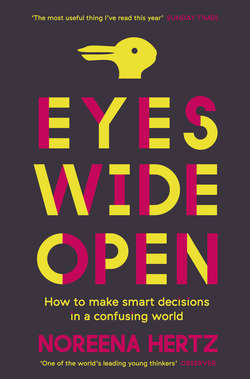Читать книгу Eyes Wide Open: How to Make Smart Decisions in a Confusing World - Noreena Hertz - Страница 11
The Age of Disorder
ОглавлениеAlongside the constant distraction and the drip, drip, drip of the deluge, the third defining characteristic of our times, the triple of the triple whammy, is disorder – a combination of the breakdown of old, established orders and the extremely unpredictable nature of our age.
For this is an age in which accepted wisdoms have been dramatically overturned. An era in which Lehman Brothers – a bank that was ‘too big to fail’ – proved to be expendable. A time when, rather than preventing women from getting sick, it turns out that regular screening for breast cancer may actually make them sicker.27
An era when certainties can no longer be presumed certain.
Who would have thought, ten years ago, that serious conversations would be taking place about the Chinese yuan replacing the US dollar as the world’s main reserve currency? That a Eurozone country – Cyprus – would impose draconian capital controls? Or that, closer to home, we might no longer be able to trust in the safety of investing in bricks and mortar?
Things we thought we could rely upon now seem ever more vulnerable and chimerical.
Moreover, those who we depended upon to translate and curate the old world order for us have, in just a few years, lost their monopoly of knowledge. Librarians are being usurped by Google, travel agents by TripAdvisor reviewers. Doctors are being challenged by the shared experiences of patients. Grey-haired newspaper proprietors by twenty-something social-media moguls.
Established orders are collapsing all around us.
This isn’t necessarily a bad thing. In an age in which our most famous economics sages failed to predict the financial crisis, in which our intelligence services failed to predict the Arab Spring, in which Facebook groups can prove to be better diagnosticians than medical experts (more on this in Step Six), and in which the tabloidisation of the broadsheet press makes us unable to blindly trust even supposedly respectable papers’ claims, the increasingly competitive information landscape is in many ways positive.
But that is not to say that this trend is categorically good. What are the agendas of these new curators? How trustworthy are they? Which is more likely to steer me to the right hotel – Joe from Idaho’s TripAdvisor testimony, or the advice of my long-trusted travel agent? And while it’s true that Wikipedia is in some subjects now as reliable as the Encyclopaedia Britannica,28 will the ‘crowd’ always have my best interests at heart?
In a time of disorder, the past can no longer be assumed to be the lodestar for the future, the future cannot easily be foreseen, and accepted truths and conventional curators of information cannot be unquestioningly relied upon.
Disorder can bring about positive change and innovation, but it can also leave us feeling compass-less and uncertain.
It’s really hard to know who to believe. Who to trust. And who to rely on to help us work out what the future will hold.
